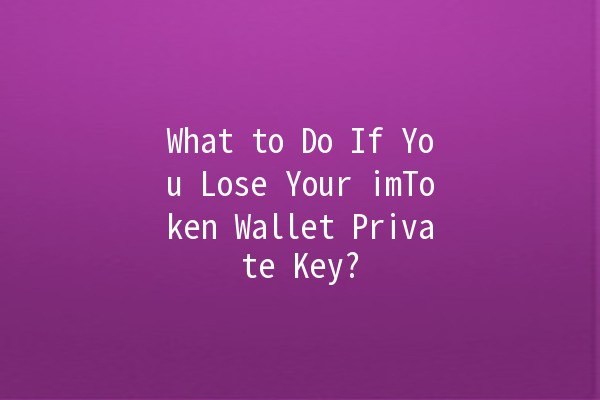Losing the private key to your imToken wallet can be a distressing experience, as it essentially means you no longer have access to your cryptocurrency assets. This article provides practical advice and tips on how to handle this situation. We’ll explore the implications of losing a private key, some preventive measures you can take, and steps to potentially recover your assets.
Your private key is a crucial component of your cryptocurrency wallet. It acts as a secure password that allows access to your funds. Without it, any attempt to access or recover those funds becomes substantially harder. Here are important aspects to comprehend:
Ownership: The private key signifies ownership of the specific cryptocurrencies associated with your wallet. Without it, you lose control.
Security: Possessing the private key allows transactions, as it is required to sign and send funds.
Before we delve into steps to take after losing your private key, let’s discuss five actionable tips for enhancing your overall security. Implementing these preemptive measures can significantly reduce the likelihood of loss and secure your digital assets.

Using a hardware wallet, such as Ledger or Trezor, can add an extra layer of security. These devices store your private keys offline, making it much harder for hackers to gain access.
Application Example: If you regularly transact with larger amounts of cryptocurrency, shifting to a hardware wallet can safeguard your assets effectively. While a hardware wallet requires an initial investment, the security it provides is worth it.
Many digital wallets (including imToken) offer options to back up your wallet data. Make it a habit to create regular backups so you can retrieve your wallet in case of loss.
Application Example: Set a recurring reminder every three months to back up your wallet data and securely store the backup files in multiple locations (e.g., cloud storage, external hard drives).
It's vital to keep your private key offline or written down in a secure place, rather than storing it on your computer or mobile device.
Application Example: Use a fireproof safe to store a physical copy of your private key. If necessary, consider splitting your key across multiple secure locations.
Always utilize strong, unique passwords for your wallets and enable twofactor authentication (2FA) when available. This prevents unauthorized access even if someone attempts to get your credentials.
Application Example: For added security, use a password manager to generate and store complex passwords, along with 2FA apps like Google Authenticator.
Continuously educate yourself about cryptocurrency security threats and best practices. Awareness of current scams can assist in avoiding them.
Application Example: Subscribe to reputable cryptocurrency publications and forums to stay updated on the latest security advisories.
Unfortunately, if you’ve reached this point, your options are significantly limited. Here are steps you can consider if your private key is lost:
Before proceeding with any other measures, check if you've made any backups. Many wallets allow you to back up your keys or mnemonics (recovery phrases). If you find a backup, you can restore access to your wallet without much hassle.
Application Example: If you’ve previously written down your recovery phrase, use it to restore your wallet within the imToken app or website.
Some services claim to assist users in recovering lost private keys. However, exercise extreme caution as many of these services can be scams.
Application Example: Research thoroughly and read user reviews before attempting to engage in any recovery service. A legitimate service may require identification or proof of ownership.
Reach out to the imToken support team with details surrounding your situation. While they typically cannot retrieve your private key, they can offer insights on how to securely manage your wallet and recommend steps forward.
Application Example: Provide as much detail as possible about your wallet setup and what led to the loss of your private key for tailored guidance.
If recovery proves impossible, the best course of action is to accept the loss and work towards creating a new wallet. Ensure to follow the necessary precautions so that it doesn’t happen a second time.
Application Example: Creating a new wallet on imToken involves generating new private keys – ensure to back these up following the tips listed above.
Consider this a learning opportunity; many in the cryptocurrency space face similar challenges. Reflecting on your experience can improve your future security practices.
Application Example: Write down a checklist or guidelines based on your experience that you can follow for future transactions, ensuring best practices are observed.
To safely store your private key, consider using a hardware wallet, writing it down and keeping it in a secure location (like a safe), and regularly backing it up. Avoid digital storage methods that connect to the internet.
While there are software solutions marketed for recovering lost private keys, be wary as they often do not work and can pose security risks. It’s essential to research the legitimacy of any tool before using it.
Without your private key, access to your specific cryptocurrency wallet is not possible. This emphasizes the importance of keeping your private key secure.
If you suspect theft, act quickly by transferring your funds to a new wallet as soon as possible. This limits the thief's access to your assets.
No, the wallet address is public and does not allow for access without the corresponding private key. You cannot retrieve funds from your wallet simply based on the address.
Many thirdparty services can be scams. Even legitimate services may ask for sensitive information putting you at risk. Always conduct thorough research before using such services.
Engaging with cryptocurrencies requires diligence and responsibility, especially regarding security. By being proactive with your precautions and aware of what to do in the event of a lost private key, you can encapsulate the nuances of securely managing your digital assets.